If you’ve seen a picture or video on social media recently of a Bali beach covered in organic waste and plastic, then you’re not alone. However, we think that this is giving the wrong impression of Bali and we’d like to talk about the issue with plastic here on the island and what the hard truth is.
Does The Indonesian Archipelago Including Bali Have A Problem With Trash?
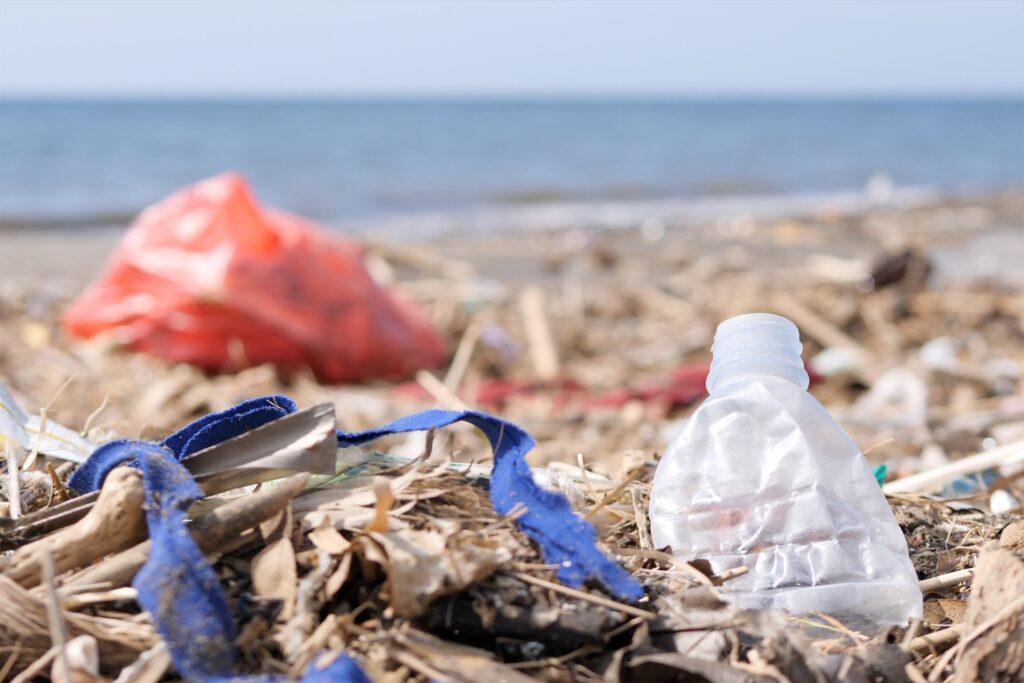
Yes. There’s no doubt about it the Indonesian archipelago, its oceans, Indonesia’s rivers and Bali’s waterways are all impacted by high volumes of trash at certain times of the year.
But, we have to stress, “certain times of the year”. In fact, trash washing up here on the beach is an annual phenomenon that takes place during the wet season.
The vast majority of the rubbish that lands on the beaches that you’ve seen on social media is seasonal. It doesn’t come from Bali in the main, it comes from the ocean and it’s a problem that they face everywhere in Indonesia and on most other beaches around the world.
However, all the iconic styrofoam and plastic cups pictured as huge trash barriers on the sand are misleading. Because everyone knows it’s a problem, the government and local communities organize regular clean-ups on the beaches.
What’s Being Done About This?
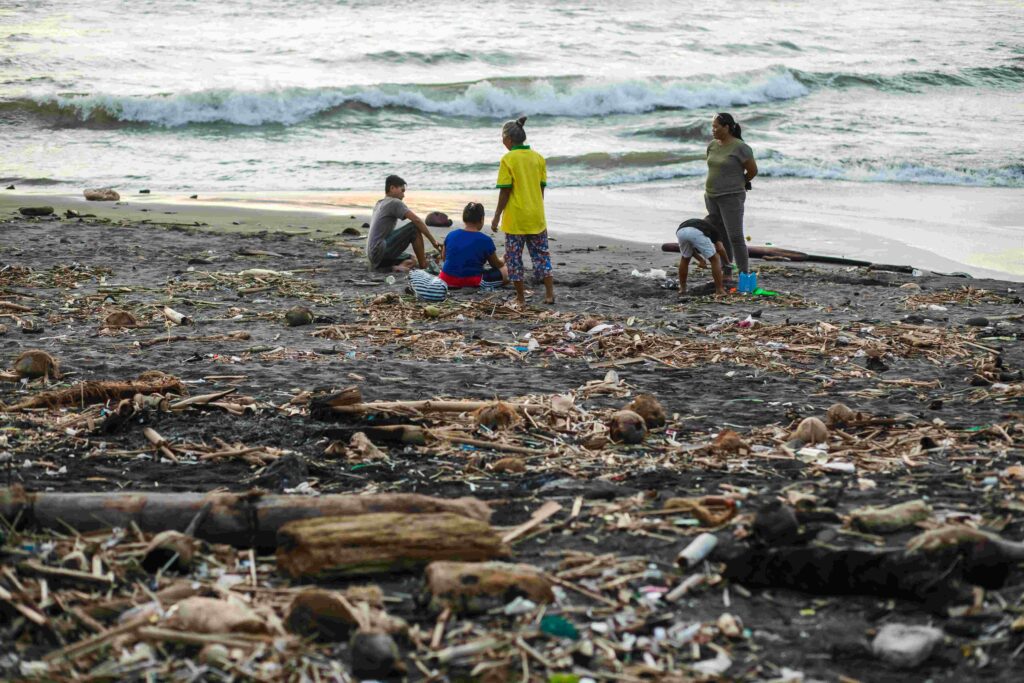
There are occasions, as with recent problems on Kuta Beach or Kendongan Beach that things do get out of control.
(Though we’d note that in 2025, pollution at Kuta Beach is much less of an issue but the erosion of the sand, which is not caused by plastic pollution, has become a serious problem, instead.)
But they are always cleaned up and within hours (or occasionally days) people are back on the beach enjoying the sun and sand.
Of course, this doesn’t mean that clean-up crews are the final solution to this issue but as a developing nation, even though the Indonesian Ministry, in charge of tourism, accept responsibility for change, it will take time for solutions to be fully implemented.
Single-use plastics have already been banned across Indonesia, and though the ban is not always 100% successful, there is an ongoing education effort to try to help Indonesians and tourists understand their impact on the environment.
The Mid-Term To Long-Term Efforts That Make A Big Difference To Plastic Pollution In Indonesia
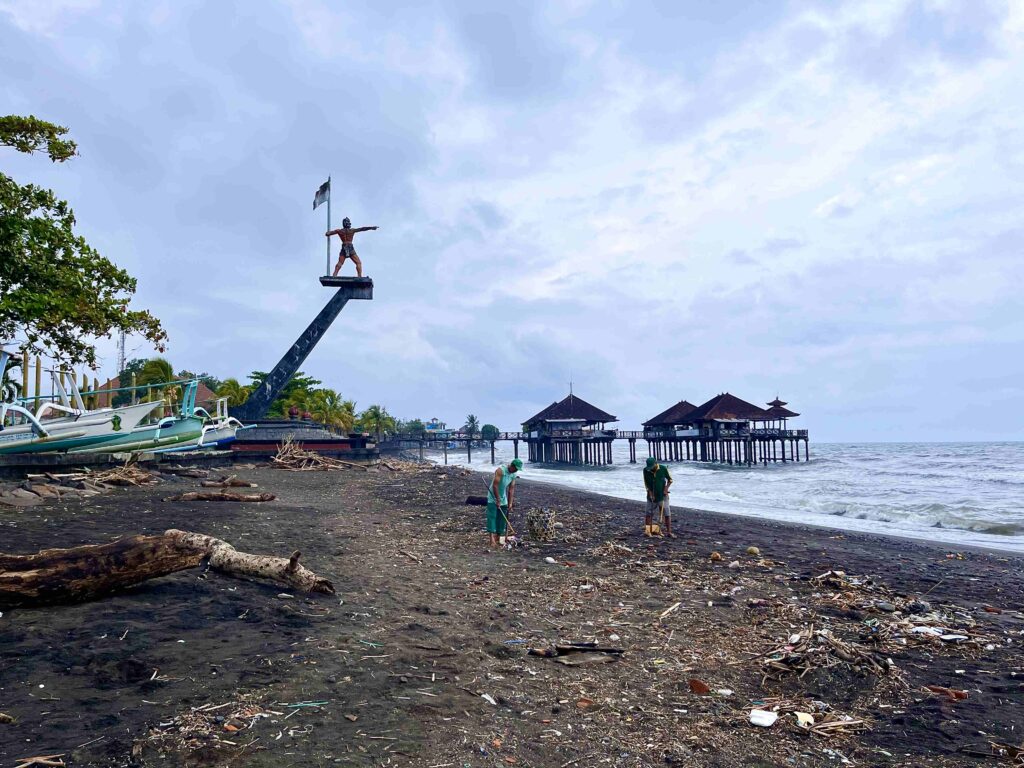
The ultimate goal is to eliminate the problem entirely, but until then, the business community is helping to deal with the waste being created and Sungai Watch, for example, has helped to remove 1.5 million kg of waste plastic from the waters of Indonesia.
Sungai Watch aren’t alone either, Bye Bye Plastic Bags, is an initiative founded by two Balinese sisters that helps to empower the youth of Bali to take action against the use of plastic in their community.
FINNS Beach Club, for example, is committed to eliminating single-use plastics and offers free water refills to anyone with a reusable bottle. The company sorts its waste to help make waste management easier and everything that can be recycled is recycled, everything that can be composted is composted, etc.
Sungai Design, an offshoot of Sungai Watch, has come up with a creative use for the plastic itself and they are making chairs and other things from the plastic captured from the ocean around Bali, Indonesia.
Overall – Plastic And Bali
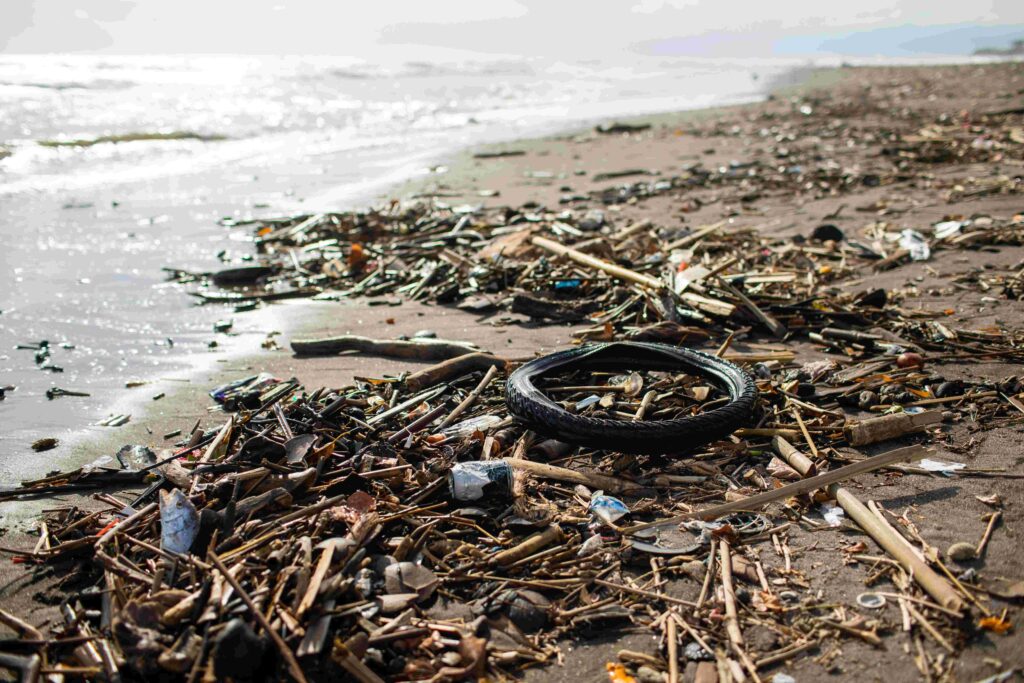
Yes, there’s a problem with the use of plastic in Indonesia and in Bali. But no, it’s not going to ruin your holiday. There are always clean beaches here and those beaches affected by the problem are usually clean again within a few hours of waste being deposited onshore by the ocean.
Over time, private industry and the government will tackle the problem to ensure that it has less of an impact, year-on-year, but even now, you shouldn’t let pictures on social media stop you from coming to this beautiful island in the Indian Ocean.
FAQs
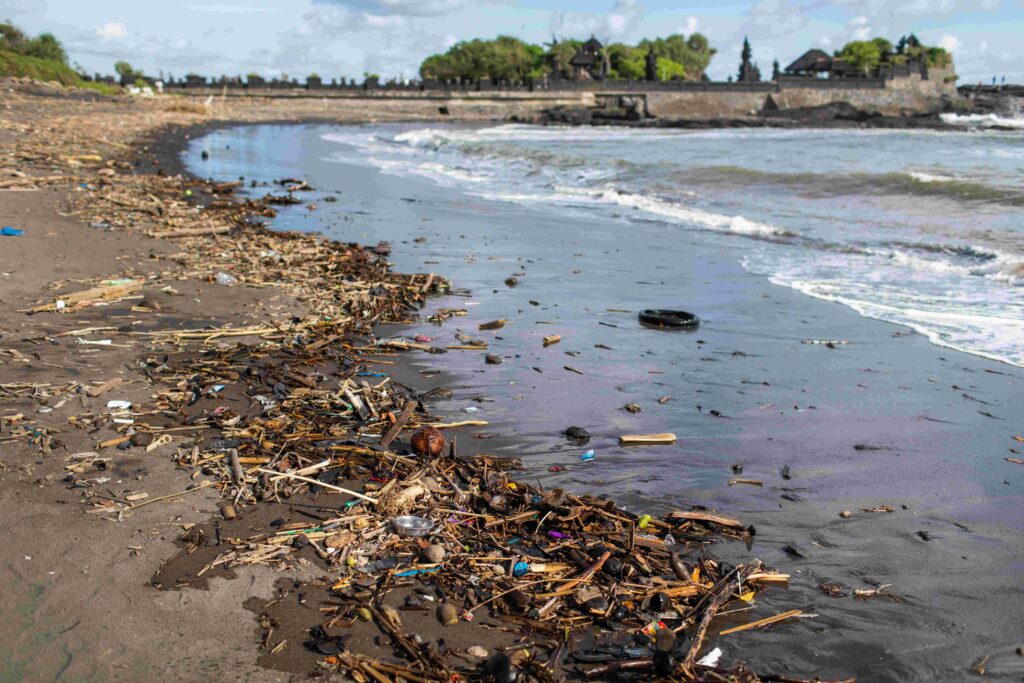
What Is The Plastic Problem In Bali?
The problem is that Bali’s beaches are, during the driving rains of the wet season, being covered in plastic during the high tides.
It is not a permanent issue and it’s one that both local people and businesses in conjunction with the government are tackling in real time.
Most beaches in Bali are cleaned on a daily basis to prevent the environment from becoming unpleasant or unmanageable for visitors.
Is Plastic Allowed In Bali?
Yes, plastic is allowed in Bali. Single-use plastics, however, are banned.
How Much Pollution Is In Bali? How Much Plastic Waste In Bali? How Much Plastic Does Bali Get On Its Beaches?
Bali produces roughly 1.6 million tonnes of waste each year, and of that, 330,000 tonnes is plastic waste.
Sadly, due to a failure in waste management, much of that goes uncollected and some of it ends up in Bali’s rivers.
However, the problems on the island’s beaches are mainly caused by plastics discarded on other islands and the waste is not normally generated here in Bali.
Is It Safe To Swim At The Beach In Bali?
There are a lot of beaches in Bali and while it’s safe to swim at some of those beaches, it’s not to safe to swim at others.
There are many factors involved in determining if it’s safe to swim at a Bali beach and plastic is just one of those factors.
We strongly recommend reading up on a beach before you visit to see if it’s suitable to swim at and using your own judgement when you arrive at the beach to ensure you stay safe.
What Are The Most Polluted Beaches In Bali?
The Balinese government and the media agree that the beaches that are usually worst affected by the seasonal plastic pollution are Kuta Beach, Seminyak Beach, Legian Beach and Jimbaran Beach.
However, it’s worth noting that any Bali beach can be affected by plastic debris coming from the ocean and several tonnes of plastic waste wash up on Bali’s beaches every day.
The reason most beaches are not covered in plastic trash and plastic bottles is that while there’s no central plastic waste management system in place in Bali everybody understands the detrimental effect.
Plastic waste is therefore cleaned off the beaches by local volunteers and professional organizations (FINNS, for example, has a team that helps to keep Berawa Beach clean and pleasant for visitors) in order to ensure that the million foreign tourists that arrive each month and the eight million domestic visitors annually can enjoy a Bali holiday without all the rubbish they might otherwise have to endure.
Which Country Wastes The Most Plastic?
Per capita of population, the United States generates the most plastic trash in the world. However, overall China generates the most plastic garbage of any nation and it is the Philippines that generates the most plastic garbage in the world’s oceans and water courses.
Are Plastic Bags Banned In Bali?
No, single-use plastics including single-use plastic bags are banned from use in Bali. That ban hasn’t eliminated all plastic bags but it has helped to reduce the volumes of plastic waste generated on the island.
Plastic straws and styrofoam takeout containers are also banned and help to reduce the number of tonnes of plastic waste created on the island each day.
Why Is Bali Vulnerable to Plastic Pollution?
Bali’s position in the ocean means that it doesn’t just have to contend with its own plastic problems, it also has to deal with marine plastic pollution from all over the region.
The island is also struggling to build a working waste management system that is adequate to the needs of the local community and the huge number of visitors that the island attracts each year.
Bali’s rivers are also suffering from pollution and a polluted river can help contribute to the pollution elsewhere on the island.
What Is FINNS Doing About Plastic Waste In Bali?
That’s a great question and we are taking many steps to ensure that we have as little impact as possible on the environment of this island and the community that we service. These steps include:
- Banning single use plastics in our workplace – all of our 2,000 staff are under strict instructions to use reusable mugs and not to use single plastics anywhere within our company property.
- Investing in a beach cleaning robot – in addition to a team of workers that cleans the local beaches of trash every day of the year except for Nyepi, we have invested tens of thousands of dollars in a beach cleaning robot system that helps to keep the local beach clear all the time.
- Waste sorting – all waste created at FINNS is sorted into multiple piles anything that can be recycled is recycled, anything that can be reused is reused and anything that can be composted is composted. We’re working towards a maximum of 3% of our waste going to landfill and we’re getting very close to that target, right now.
- ESG Team – we have a dedicated team in-house dedicated to helping us come up with better ways to work with the environment of Bali, with the people of the island and to develop the right governance structures to make this effective.
No business in Bali is currently 100% environmentally friendly but many businesses are striving to become that way and we believe that FINNNS is one the leaders in eco-responsibility here on the island.
Final Thoughts On Plastic Bali
Plastic rubbish is a real problem in Bali and it’s one that is recognized by both the local government and the Indonesian government.
As a tourist destination, Bali is seeking to improve this situation as best as possible and the introduction of the Bali tourist tax is expected to generate revenue to improve waste management and to encourage company owners to create greener tourism initiatives on the island.
We must stress, however, that the issues on beaches in Bali are both seasonal and temporary and that the majority of beaches are cleared of waste on a daily basis and that the picture painted by social media is not the whole picture.













